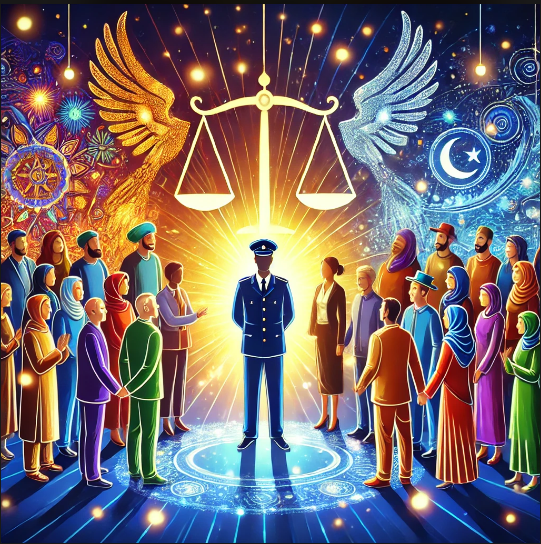Introduction
Tolerance is an essential virtue in a diverse and democratic society. It enables individuals to accept differences, respect divergent viewpoints, and foster social harmony. For civil servants, tolerance is not just a personal virtue but a professional necessity. Given their role in governance and public administration, civil servants frequently encounter complex situations that require impartiality, patience, and an unwavering commitment to justice. This article explores why tolerance is the supreme fundamental value for civil servants and how it shapes their responsibilities and effectiveness in governance.
Understanding Tolerance
Definition: Tolerance refers to the ability to respect and accept differences in opinions, beliefs, cultures, and practices, even when they contradict one’s own values or experiences. It is a fundamental principle of democratic societies, ensuring peaceful coexistence among diverse groups.
Key Aspects of Tolerance:
- Acceptance of Diversity: Acknowledging and respecting differences in race, religion, culture, gender, and ideologies.
- Resilience in Adversity: Maintaining composure and patience when faced with opposing views or criticism.
- Non-Discrimination: Ensuring impartiality and fairness in decision-making, regardless of personal biases.
- Conflict Resolution: Using dialogue and negotiation instead of coercion to address disagreements.
- Ethical Governance: Upholding moral principles and legal frameworks that promote inclusivity and justice.
The Role of Tolerance in Civil Services
Civil servants are entrusted with the responsibility of implementing policies, maintaining law and order, and addressing the concerns of diverse populations. In this capacity, tolerance plays a crucial role in the following ways:
1. Ensuring Impartial and Just Governance
Civil servants serve all sections of society, irrespective of caste, religion, ethnicity, or economic status. Tolerance enables them to remain impartial and make decisions based on merit, law, and ethical considerations rather than personal prejudices.
Example: A district magistrate handling religious disputes must ensure that all communities receive equal protection under the law, preventing any form of discrimination or favoritism.
2. Promoting Social Harmony
Tolerance helps civil servants bridge the gap between different social groups by fostering understanding and cooperation. This is especially vital in multi-ethnic and multi-religious societies where conflicts often arise due to cultural differences.
Example: A civil servant working in a riot-affected area can use tolerance as a tool to mediate discussions, build trust, and promote peaceful resolutions.
3. Strengthening Democratic Institutions
Democracy thrives on the principles of tolerance, debate, and dialogue. Civil servants, as the backbone of governance, must ensure that democratic institutions function efficiently and inclusively.
Example: During elections, election officers must remain neutral and ensure free and fair voting, irrespective of political biases.
4. Encouraging Public Participation in Governance
When civil servants exhibit tolerance, they create an environment where citizens feel valued and heard. This, in turn, encourages civic engagement and cooperation between the government and the public.
Example: An administrative officer organizing public hearings for policy discussions should actively listen to various opinions and consider all perspectives before making decisions.
5. Handling Criticism Constructively
Public servants often face criticism from the media, opposition parties, and citizens. Tolerance allows them to process criticism objectively, learn from feedback, and improve governance without personal resentment.
Example: A policy implemented by a bureaucrat may receive backlash from certain groups. Instead of reacting defensively, a tolerant civil servant would assess the concerns and, if necessary, make appropriate modifications.
6. Addressing Social Inequalities and Marginalization
Tolerance is vital for addressing issues of social justice and ensuring the upliftment of marginalized communities. A civil servant must be empathetic and inclusive while formulating and implementing policies.
Example: A welfare officer working on schemes for Dalits, women, or LGBTQ+ communities must ensure that these policies are implemented with fairness and without any bias.
Challenges to Tolerance in Civil Services
Despite its importance, civil servants often encounter challenges in practicing tolerance:
- Political Pressure: Politicization of administration can create conflicts between personal integrity and external pressures.
- Bureaucratic Resistance: Resistance to progressive change within the system may test a civil servant’s tolerance.
- Public Hostility: Handling agitated or misinformed citizens requires immense patience and resilience.
- Ethical Dilemmas: Balancing different interests while maintaining justice and fairness can be challenging.
- Personal Biases: Overcoming personal prejudices requires conscious effort and self-discipline.
To overcome these challenges, civil servants must undergo continuous training in ethical leadership, emotional intelligence, and conflict resolution.
Developing Tolerance in Civil Services
To institutionalize tolerance within governance, civil servants must cultivate the following qualities:
- Empathy: Understanding the concerns and emotions of citizens to make informed and humane decisions.
- Active Listening: Paying attention to diverse viewpoints and considering them in decision-making.
- Emotional Intelligence: Managing one’s emotions and responding to situations with patience and diplomacy.
- Ethical Commitment: Upholding values of justice, fairness, and equality at all times.
- Intercultural Awareness: Learning about different cultures, traditions, and histories to foster mutual respect.
Conclusion
Tolerance is the cornerstone of ethical governance and effective public administration. It enables civil servants to navigate complex societal issues, foster inclusivity, and ensure justice for all. Without tolerance, governance would be marred by prejudice, conflict, and inefficiency. Therefore, civil servants must embody tolerance as a fundamental value to uphold the principles of democracy and public service.
In a rapidly evolving and diverse society, the role of tolerance in civil services is more significant than ever. A tolerant civil servant not only promotes social harmony but also strengthens the foundations of good governance. Hence, tolerance is not just a virtue; it is a necessity for building a just, peaceful, and progressive society.




